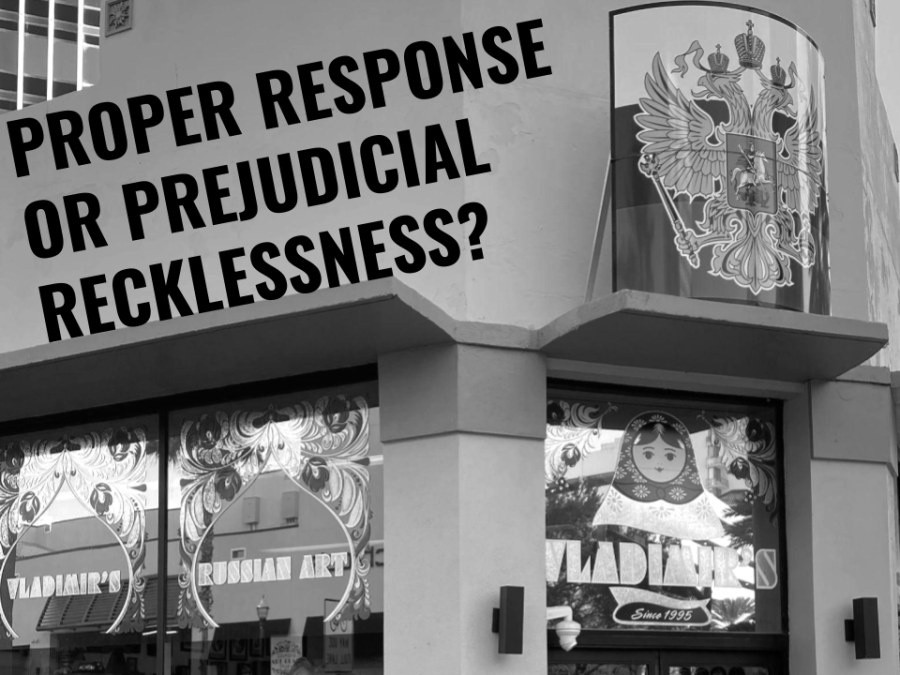Proper response or prejudicial recklessness?
While the myriad responses to the ongoing Ukraine crisis have been largely well-intentioned, many of them unfairly exacerbate, escalate and discriminate.
March 8, 2022
For the past two weeks, debates have raged on about the proper response to the ongoing Ukraine crisis. Unfortunately, the vast majority of America’s myriad responses to the tragedy will only exacerbate tensions and harm innocent people.
To understand the expected efficacy of America’s responses, one must first understand what those responses were. In the recent State of the Union, President Biden affirmed his desire to isolate Russia and that Putin “has no idea what’s coming.” Afterwards, a large, bipartisan group of senators called for a 5% increase in the military budget. Such ominous rhetoric, though perhaps understandable, only wins the animosity of Russia and its people. When the U.S. already spends more on its military than the next 11 countries combined, this increase seems ludicrous and unnecessarily escalatory. Recent calls for no-fly-zones, akin to a declaration of war, are in the same vein.
Perhaps most shockingly, as the New York Times reported, the International Paralympic Committee recently barred Russian and Belarussian athletes from competing. Not only is this completely unnecessary and harmful to innocent, hard-working people who had nothing to do with the invasion; it also won’t do anything but antagonize Russian individuals and escalate conflict with the Russian government. On a more local scale, as Forbes reported, states from Utah to New Hampshire to Ohio to Pennsylvania have banned Russian vodka and similar products. These states, of which there are 10 in total, echo the similar trend of companies ceasing operations in Russia. From Disney to Ikea to Spotify to Google to Airbnb to Nike and dozens more, the roster is far too long to detail. It even includes credit card companies like Visa and Mastercard, whose withdrawal will leave millions of Russians in a state of financial purgatory at best. For some people, connections to such financial institutions created their “only source of income.” What possible benefit for policy or the people can come from these corporate withdrawals? If dozens of the world’s largest companies withdrew from the U.S. after it invaded Iraq, Americans would rightly be irked for the harm it would cause them, yet most Americans support the ongoing corporate withdrawals from Russia. These responses are nothing but empty gestures, well-intentioned as they might be. Presently, the target country’s government shows no signs of slowing its militaristic desire; thus, while these corporate withdrawals might create positive optics, little else of practical importance is attained.
Furthermore, certain restaurants in Canada have stopped serving poutine, a classic Canadian dish, merely because it resembles the Russian leader’s name. Russian stores and restaurants have been vandalized and received “harassing phone calls,” despite them having no connection to the invasion; they are merely companies trying to survive in an increasingly polarized climate. A week ago, Congressman Eric Swalwell proposed forcing all Russian students out of the U.S., and British MP Roger Gale even suggested evicting “all Russian people” from the U.K. While these proposals were largely condemned, the mere fact they were brought up in the public sphere evidences the notion that we are perhaps surprisingly but certainly dangerously close to normalizing actions tantamount to xenophobia. Even in Europe, as the Washington Post reported, some “stores and restaurants have put up signs in Czech and Russian saying, ‘We won’t serve Russian and Belarusian occupants.’ [M]ultiple expats said they were grappling with feelings of shame and of being newly uncomfortable about their nationality.”
The direct consequence of this antagonization is, ironically, increased support for President Putin. As The Conversation noted, his popularity is soaring from where it was previously, even though it might be only temporary. It seems a combination of the “rally-around-the-flag effect” and vilification of Russian people has created more animosity toward countries like the U.S. Even the mere threat of U.S. sanctions or corporate withdrawal causes civilians, who would be and are harmed by them, to turn to their own country’s leader, who at least feigns concern for their welfare. The same phenomenon has occurred repeatedly in many other countries on which the U.S. has imposed sanctions, yet the U.S. has seemingly not learned from these follies.
Indeed, as a Russia specific analysis from the Hill found, U.S. sanctions have quite literally never changed Russian (or Soviet) policies. Instead, they have caused counter-sanctions, lost billions in potential revenue and bolstered nationalism. All that sanctions seem to be good at is harming civilians. Corporate withdrawal and student prohibition will thus have no impact at all on Russia’s government but purely adverse impacts on its people.
Russian people are not culpable for the invasion, even if one believes the vast majority of them support it (one could cite Putin’s latest electoral margins, for instance). Crucially, anti-war demonstrations at which many thousands were present have occurred across the country, demonstrating at least some degree of popular resistance. Furthermore, many demonstrators have been arrested, which implies that there are likely many who feign support or indifference to the war but are in reality apprehensive to publicly condemn it.
Yet on a broader scale, if the aforementioned punitive measures are really necessary (a “necessary evil,” or the “lesser of two bad options,” as some online have described them), we must apply the same logic consistently. By the same faulty reasoning, one can ascribe guilt to every American for the death, destruction and destitution the U.S. caused in Iraq and other countries; at the least, one can do so for the millions who voted for George W. Bush et al. This guilt can then be used to justify punitive and cruel measures against civilians who had no interest or involvement in such actions. Such faulty reasoning thus has dangerous possible implications. In Russia’s case, it has harmed and will continue to harm innocent people and their families, including my own.
If current measures, which some are frighteningly criticizing as not hawkish enough, do not suffice, what then is the proper course of action for the U.S.? It’s not an easy or simple conflict, and thus the solution will necessarily be complex. Above all else, a proper solution will protect civilians in every nation, from Ukraine to Russia, rather than continuing to embolden the powers that harm them. There scarcely seems to be a good option in this geopolitical quagmire, but it seems that the least bad choice is to attempt diplomatic de-escalation with the interest of all the world’s citizens at heart. The solution must change governmental policy (perhaps by influencing the oligarchs) but harm no civilians. To truly remedy the ongoing crisis, America must stop emboldening its creator through civilian-harming sanctions, corporate withdrawals and borderline xenophobic actions.
None of this should be construed as defending brazen imperialism. That the invasion was immoral and wanton is beyond the scope of reasonable debate here. However, if we seek to maximize wellbeing for all citizens of the Earth, the vast majority of which are simply trying to subsist for themselves and posterity, we must transcend Russophobia and regressive belligerence. We must not escalate and antagonize, especially with innocent people who have done no wrong. Only then can we move forward for peace and progress for all.









